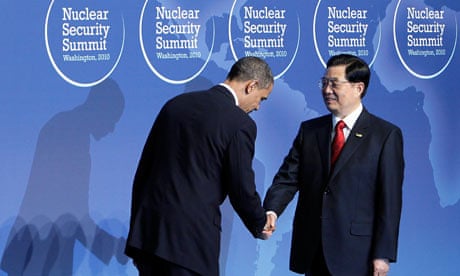China has agreed to work with the US on possible new sanctions against Iran as Ukraine announced it would give up its weapons-grade enriched uranium at a nuclear summit in Washington.
President Barack Obama opened the global security summit last night after two days of meetings with leaders of 47 countries assembled to redouble efforts to keep nuclear material out of terrorist hands.
China's incremental move toward US ambitions to sanction Iran and Ukraine's plans get rid of highly enriched uranium provided momentum to Obama's to improve nuclear security.
Obama's meeting with Chinese president Hu Jintao was the last of the summit warm-up sessions before the US leader sat down with his guests at a working dinner.
After the Hu meeting, White House national security aide Jeff Bader said Iran was a major topic of discussion at the 90-minute session.
"They're prepared to work with us," Bader said, interpreting that willingness as "another sign of international unity on this issue".
The upbeat assessment reflected a recent warming of US-Chinese diplomatic ties. Still, the meeting produced no breakthroughs. And Chinese spokesman Ma Zhaoxu did not mention sanctions in a statement on Hu's meeting with Obama.
Ma said China hopes all parties will step up diplomatic efforts and seek ways to resolve the Iranian nuclear issue through negotiations.
"China and the United States share the same overall goal on the Iranian nuclear issue," the Chinese statement said.
Obama has been pressing the case that a fourth round of sanctions are needed to convince Iran to alter its perceived course toward a nuclear weapons capability.
China, while historically averse to tough sanctions and uneasy about potential damage to its trade relationship with Tehran, may indeed be coming on board with Obama.
The US already has the backing of Britain, France and Germany. Russia, too, has shown a willingness to join the sanctions effort. But when pressed on whether China had committed to anything specific on the sanctions front, Bader was less direct.
"We are going to be we've started to work that and we're going to be working on that in the coming days coming days and weeks," he said. Obama wants agreement on sanctions before summer.
Brazil and Turkey, which both hold non-permanent seats on the UN security council, are studying an alternative proposal to deal with Iran's controversial nuclear programme, Brazilian foreign minister Celso Amorim said yesterday.
The Brazilian president, Luiz Inácio Lula da Silva, and the Turkish prime minister, Recep Tayyip Erdoğan, talked about a strategy different from sanctions, Amorim said.
Amorim told a news conference that Brazil agrees with the permanent members of the security council seeking a "diplomatic solution," but Brazil has a different perspective on how the issue should be approached.
Erdogan said at a speech on the sidelines of the conference that his country does not want Iran or any other nation to have nuclear weapons.
While the US worries about Iran's nuclear programme, Turkey has its own concerns about Israel's nuclear programme. The Israeli prime minister, Benjamin Netanyahu, opted not to attend Obama's summit amid concern that Turkey and Egypt would use the conference as a platform to challenge him over his country's widely assumed nuclear arsenal, which the Jewish state never has acknowledged.
